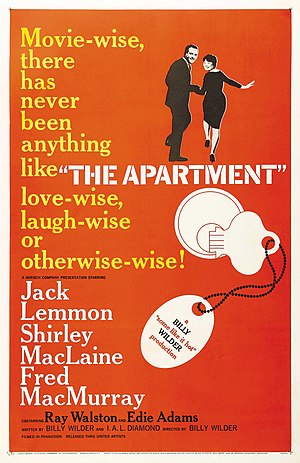The Apartment
Jump to navigation
Jump to search
| The Apartment | ||||||||||||||||||||||||||||
|---|---|---|---|---|---|---|---|---|---|---|---|---|---|---|---|---|---|---|---|---|---|---|---|---|---|---|---|---|
This film has been preserved in the National Film Registry in 1994.
| ||||||||||||||||||||||||||||
 | ||||||||||||||||||||||||||||
|
The Apartment is a 1960 American romantic comedy-drama film directed and produced by Billy Wilder from a screenplay he co-wrote with I. A. L. Diamond.
Why It Rocks
- In some ways the film sums up both the 1950s and Billy Wilder's career. It offered his most scathing account of corporate America, which he had been refining since Ace in the Hole.
- The idea of setting the film in corporate New York City may have been a brilliant move from Wilder, especially since he was partly responsible for promoting the hedonistic bachelor lifestyle that dominated a lot of American pop culture in the 1950s (i.e.: Richard Sherman trying to cheat on his wife in The Seven Year Itch, or Joe/"Josephine" trying to bed Sugar Kane in Some Like It Hot). This film takes an efficient look at that phenomenon, twisting the conventions of bedroom faces to show just what was at stake behind all the office parties, supper clubs and assignations. Work in the film is meaningless and soulless, but life outside of work is just as bad: demeaning, corrupting, and ultimately hollow.
- While the film's message (as mentioned in the previous pointer) is depressing, the film's occasional light-hearted humor, and the performances from the leads prevent the film from becoming too bleak.
- First off, Jack Lemmon was transitioning to leading man. This film may be his best showcase, as his part consists of a series of demanding acting exercises: playing sick, playing drunk, working with props like shaving cream or a bowler hat, doing physical and verbal comedy, suggesting unrequited love and accepting rejection.
- Shirley MacLaine's performance manages to disguise emotional vulnerability with false bravado.
- Personal manager Sheldrake, the film's antagonist, was skillfully portrayed by a reluctant Fred MacMurray
- Aside from a few cheap digs at television, the film's unusually focused, even by Wilder and Diamond's standards. Their preferred method is indirection: Instead of the characters telling each other everything, characters become aware of their circumstances through dropped asides, misplaced props, and overheard phone calls.
- The chain of events set off by each sexual conquest the film never really ends, but instead circles back to ensnare new victims. But for once, Wilder's cynicism seems justified, and for once it's tempered by sympathy for his characters.
- There's a very skillfully done scene at an office Christmas party. A lot of the scene takes place in C.C. Baxter's glass-walled office as he tries to persuade Fran Kubelik to go out with him. He's following proper dating etiquette, but everything he says has the opposite effect on Kubelik, who just found out her lover was lying to her. She can't stop Baxter and she can't tell him the truth. She also doesn't understand why his attitude suddenly changes, as he can't tell her how her cosmetics case reveals another side of her character. Written with unerring precision, the scene's directed with a delicacy rarely seen in Wilder's previous films.
Bad Qualities
- One particular scene in the film has aged very poorly: A scene C.C. Baxter informs Miss Kubelik that he looked up her card in the group insurance file and then recites back to her where she lives, who she lives with, her height, her weight, and her social security number. She finds this to be amusing, and this is painted as a light-hearted and innocent. but nowadays, Baxter would be viewed as a creepy stalker who invaded Kubelik's privacy.
Comments
Loading comments...